1. Doepke M, Hazan M, Maoz Y. National Bureau of Economic Research. The Baby Boom and World War II a Macroeconomic Analysis. NBER Working Paper Series Working Paper 13707. Cambridge (MA): National Bureau of Economic Research;2007.
3. Vaillant GE, Mukamal K. Successful aging. Am J Psychiatry. 2001; 158:839–847. PMID:
11384887.
4. Shao M, Lin X, Jiang D, Tian H, Xu Y, Wang L, Ji F, Zhou C, Song X, Zhuo C. Depression and cardiovascular disease: shared molecular mechanisms and clinical implications. Psychiatry Res. 2020; 285:112802. PMID:
32036152.
5. Turner AD, James BD, Capuano AW, Aggarwal NT, Barnes LL. Perceived stress and cognitive decline in different cognitive domains in a cohort of older African Americans. Am J Geriatr Psychiatry. 2017; 25:25–34. PMID:
28231871.
6. Krantz DS, Shank LM, Goodie JL. Post-traumatic stress disorder (PTSD) as a systemic disorder: pathways to cardiovascular disease. Health Psychol. 2022; 41:651–662. PMID:
34807673.
7. Booth J, Connelly L, Lawrence M, Chalmers C, Joice S, Becker C, Dougall N. Evidence of perceived psychosocial stress as a risk factor for stroke in adults: a meta-analysis. BMC Neurol. 2015; 15:233. PMID:
26563170.
8. Steptoe A, Marmot M. Burden of psychosocial adversity and vulnerability in middle age: associations with biobehavioral risk factors and quality of life. Psychosom Med. 2003; 65:1029–1037. PMID:
14645782.
9. Chang HK. Influencing factors on mid-life crisis. Korean J Adult Nurs. 2018; 30:98–105.
10. Jacka FN, Cherbuin N, Anstey KJ, Butterworth P. Does reverse causality explain the relationship between diet and depression? J Affect Disord. 2015; 175:248–250. PMID:
25658499.
11. Elstgeest LE, Visser M, Penninx BW, Colpo M, Bandinelli S, Brouwer IA. Bidirectional associations between food groups and depressive symptoms: longitudinal findings from the Invecchiare in Chianti (InCHIANTI) study. Br J Nutr. 2019; 121:439–450. PMID:
30588894.
12. Bach-Faig A, Berry EM, Lairon D, Reguant J, Trichopoulou A, Dernini S, Medina FX, Battino M, Belahsen R, Miranda G, et al. Mediterranean diet pyramid today. Science and cultural updates. Public Health Nutr. 2011; 14:2274–2284. PMID:
22166184.
13. Lara J, McCrum LA, Mathers JC. Association of Mediterranean diet and other health behaviours with barriers to healthy eating and perceived health among British adults of retirement age. Maturitas. 2014; 79:292–298. PMID:
25096829.
14. Sánchez-Villegas A, Delgado-Rodríguez M, Alonso A, Schlatter J, Lahortiga F, Serra Majem L, Martínez-González MA. Association of the Mediterranean dietary pattern with the incidence of depression: the Seguimiento Universidad de Navarra/University of Navarra follow-up (SUN) cohort. Arch Gen Psychiatry. 2009; 66:1090–1098. PMID:
19805699.
15. Godos J, Grosso G, Ferri R, Caraci F, Lanza G, Al-Qahtani WH, Caruso G, Castellano S. Mediterranean diet, mental health, cognitive status, quality of life, and successful aging in southern Italian older adults. Exp Gerontol. 2023; 175:112143. PMID:
36907474.
16. Shively CA, Frye BM, Negrey JD, Johnson CS, Sutphen CL, Molina AJ, Yadav H, Snyder-Mackler N, Register TC. The interactive effects of psychosocial stress and diet composition on health in primates. Neurosci Biobehav Rev. 2023; 152:105320. PMID:
37453725.
17. D’Amico D, Huang V, Fiocco AJ. Examining the moderating role of a Mediterranean diet in the relationship between perceived stress and cognitive function in older adults. J Gerontol B Psychol Sci Soc Sci. 2021; 76:435–443. PMID:
32103258.
18. Kim Y, Han BG. KoGES group. Cohort profile: the Korean Genome and Epidemiology Study (KoGES) consortium. Int J Epidemiol. 2017; 46:e20. PMID:
27085081.
19. Ahn Y, Kwon E, Shim JE, Park MK, Joo Y, Kimm K, Park C, Kim DH. Validation and reproducibility of food frequency questionnaire for Korean genome epidemiologic study. Eur J Clin Nutr. 2007; 61:1435–1441. PMID:
17299477.
20. Ahn Y, Lee JE, Paik HY, Lee HK, Jo I, Kimm K. Development of a semi-quantitative food frequency questionnaire based on dietary data from the Korea National Health and Nutrition Examination Survey. Nutr Sci. 2003; 6:173–184.
21. Panagiotakos DB, Pitsavos C, Stefanadis C. Dietary patterns: a Mediterranean diet score and its relation to clinical and biological markers of cardiovascular disease risk. Nutr Metab Cardiovasc Dis. 2006; 16:559–568. PMID:
17126772.
22. Park E. Effect of a Mediterranean-type diet on a reduction of cardiovascular disease risk: using the Korean Genome and Epidemiology Study data [master’s thesis]. Seoul: Korea University;2017.
23. Park JE, Choi TY, Ryu Y, Cho SI. The relationship between mild alcohol consumption and mortality in Koreans: a systematic review and meta-analysis. BMC Public Health. 2015; 15:918. PMID:
26385795.
24. Hutchins-Wiese HL, Bales CW, Porter Starr KN. Mediterranean diet scoring systems: understanding the evolution and applications for Mediterranean and non-Mediterranean countries. Br J Nutr. 2022; 128:1371–1392. PMID:
34289917.
25. Chang SJ. Stress. The Korean Society for Preventive Medicine. Health Data Collection and Standardization of Them Measurements. Seoul: Keychuk Munwhasa;2000. p. 92–143.
26. Marin MF, Lord C, Andrews J, Juster RP, Sindi S, Arsenault-Lapierre G, Fiocco AJ, Lupien SJ. Chronic stress, cognitive functioning and mental health. Neurobiol Learn Mem. 2011; 96:583–595. PMID:
21376129.
27. Black PH. The inflammatory response is an integral part of the stress response: Implications for atherosclerosis, insulin resistance, type II diabetes and metabolic syndrome X. Brain Behav Immun. 2003; 17:350–364. PMID:
12946657.
28. Mohan A, Huybrechts I, Michels N. Psychosocial stress and cancer risk: a narrative review. Eur J Cancer Prev. 2022; 31:585–599. PMID:
35352705.
29. Sparrenberger F, Cichelero FT, Ascoli AM, Fonseca FP, Weiss G, Berwanger O, Fuchs SC, Moreira LB, Fuchs FD. Does psychosocial stress cause hypertension? A systematic review of observational studies. J Hum Hypertens. 2009; 23:12–19. PMID:
18615099.
30. Johnson TV, Abbasi A, Master VA. Systematic review of the evidence of a relationship between chronic psychosocial stress and C-reactive protein. Mol Diagn Ther. 2013; 17:147–164. PMID:
23615944.
31. McGrattan AM, McGuinness B, McKinley MC, Kee F, Passmore P, Woodside JV, McEvoy CT. Diet and inflammation in cognitive ageing and Alzheimer’s disease. Curr Nutr Rep. 2019; 8:53–65. PMID:
30949921.
32. Sarris J, Logan AC, Akbaraly TN, Amminger GP, Balanzá-Martínez V, Freeman MP, Hibbeln J, Matsuoka Y, Mischoulon D, Mizoue T, et al. Nutritional medicine as mainstream in psychiatry. Lancet Psychiatry. 2015; 2:271–274. PMID:
26359904.
33. Lai JS, Hiles S, Bisquera A, Hure AJ, McEvoy M, Attia J. A systematic review and meta-analysis of dietary patterns and depression in community-dwelling adults. Am J Clin Nutr. 2014; 99:181–197. PMID:
24196402.
34. Osimo EF, Cardinal RN, Jones PB, Khandaker GM. Prevalence and correlates of low-grade systemic inflammation in adult psychiatric inpatients: An electronic health record-based study. Psychoneuroendocrinology. 2018; 91:226–234. PMID:
29544672.
35. Miller AH, Raison CL. The role of inflammation in depression: from evolutionary imperative to modern treatment target. Nat Rev Immunol. 2016; 16:22–34. PMID:
26711676.
36. Lassale C, Batty GD, Baghdadli A, Jacka F, Sánchez-Villegas A, Kivimäki M, Akbaraly T. Healthy dietary indices and risk of depressive outcomes: a systematic review and meta-analysis of observational studies. Mol Psychiatry. 2019; 24:965–986. PMID:
30254236.
37. Kastorini CM, Milionis HJ, Esposito K, Giugliano D, Goudevenos JA, Panagiotakos DB. The effect of Mediterranean diet on metabolic syndrome and its components: a meta-analysis of 50 studies and 534,906 individuals. J Am Coll Cardiol. 2011; 57:1299–1313. PMID:
21392646.
38. Esposito K, Marfella R, Ciotola M, Di Palo C, Giugliano F, Giugliano G, D’Armiento M, D’Andrea F, Giugliano D. Effect of a mediterranean-style diet on endothelial dysfunction and markers of vascular inflammation in the metabolic syndrome: a randomized trial. JAMA. 2004; 292:1440–1446. PMID:
15383514.
39. Moylan S, Berk M, Dean OM, Samuni Y, Williams LJ, O’Neil A, Hayley AC, Pasco JA, Anderson G, Jacka FN, et al. Oxidative & nitrosative stress in depression: why so much stress? Neurosci Biobehav Rev. 2014; 45:46–62. PMID:
24858007.
40. Liu T, Zhong S, Liao X, Chen J, He T, Lai S, Jia Y. A meta-analysis of oxidative stress markers in depression. PLoS One. 2015; 10:e0138904. PMID:
26445247.
41. Godos J, Caraci F, Castellano S, Currenti W, Galvano F, Ferri R, Grosso G. Association between dietary flavonoids intake and cognitive function in an Italian cohort. Biomolecules. 2020; 10:1300. PMID:
32916935.
42. Grosso G, Laudisio D, Frias-Toral E, Barrea L, Muscogiuri G, Savastano S, Colao A. Anti-inflammatory nutrients and obesity-associated metabolic-inflammation: state of the art and future direction. Nutrients. 2022; 14:1137. PMID:
35334794.
43. Tardy AL, Pouteau E, Marquez D, Yilmaz C, Scholey A. Vitamins and minerals for energy, fatigue and cognition: a narrative review of the biochemical and clinical evidence. Nutrients. 2020; 12:228. PMID:
31963141.
44. Głąbska D, Guzek D, Groele B, Gutkowska K. Fruit and vegetable intake and mental health in adults: a systematic review. Nutrients. 2020; 12:115. PMID:
31906271.
45. Hernández-Díaz S, Martínez-Losa E, Fernández-Jarne E, Serrano-Martínez M, Martínez-González MA. Dietary folate and the risk of nonfatal myocardial infarction. Epidemiology. 2002; 13:700–706. PMID:
12410012.
46. Sachdev PS, Parslow RA, Lux O, Salonikas C, Wen W, Naidoo D, Christensen H, Jorm AF. Relationship of homocysteine, folic acid and vitamin B12 with depression in a middle-aged community sample. Psychol Med. 2005; 35:529–538. PMID:
15856723.
47. Calder PC. The relationship between the fatty acid composition of immune cells and their function. Prostaglandins Leukot Essent Fatty Acids. 2008; 79:101–108. PMID:
18951005.
48. Matsuoka YJ, Sawada N, Mimura M, Shikimoto R, Nozaki S, Hamazaki K, Uchitomi Y, Tsugane S. Dietary fish, n-3 polyunsaturated fatty acid consumption, and depression risk in Japan: a population-based prospective cohort study. Transl Psychiatry. 2017; 7:e1242. PMID:
28949340.

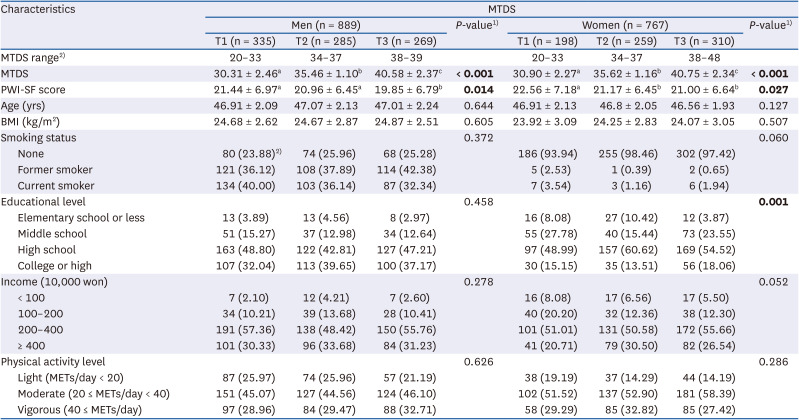
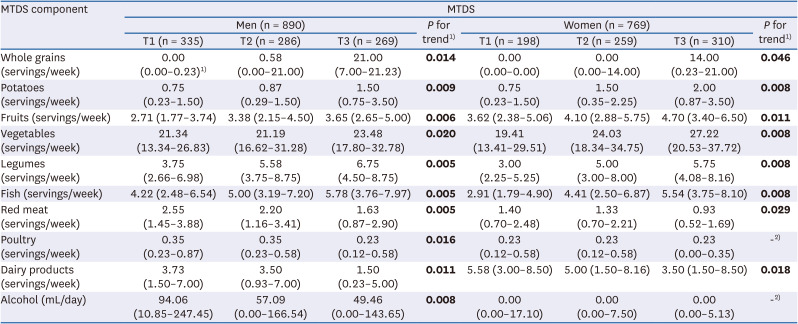
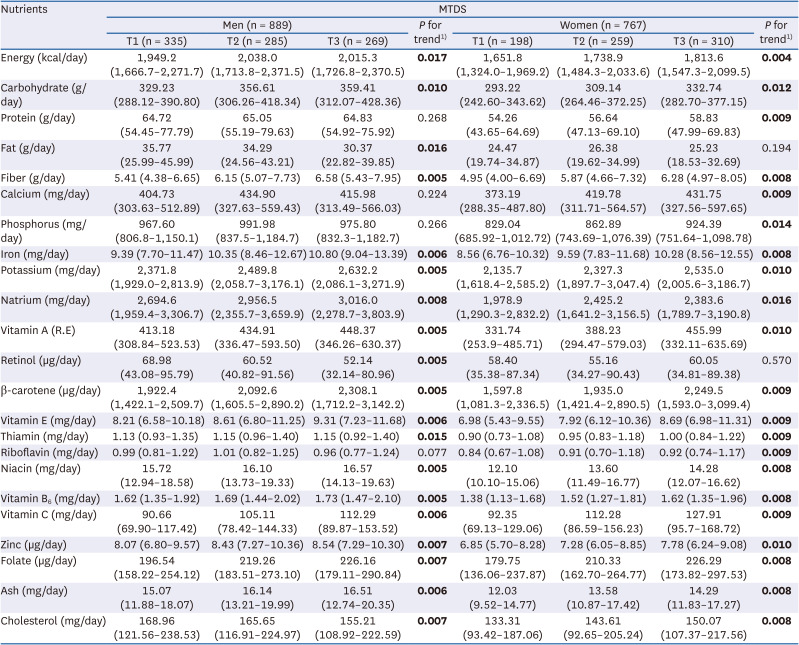
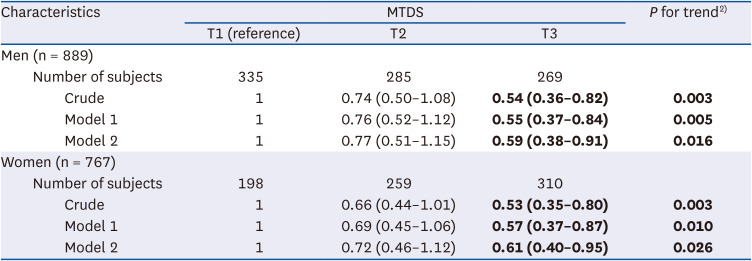




 PDF
PDF Citation
Citation Print
Print



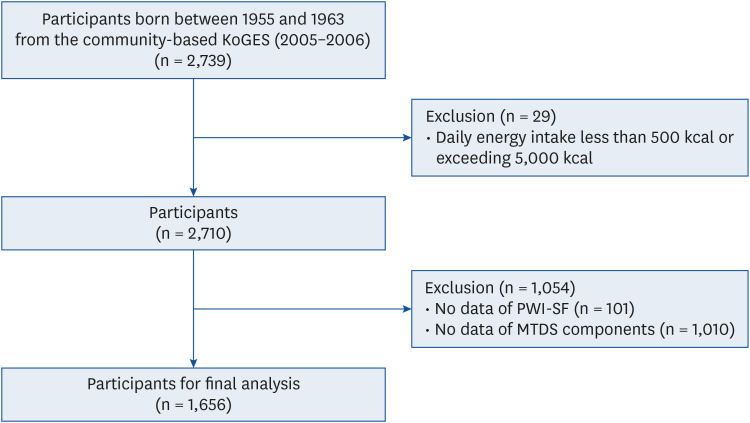
 XML Download
XML Download